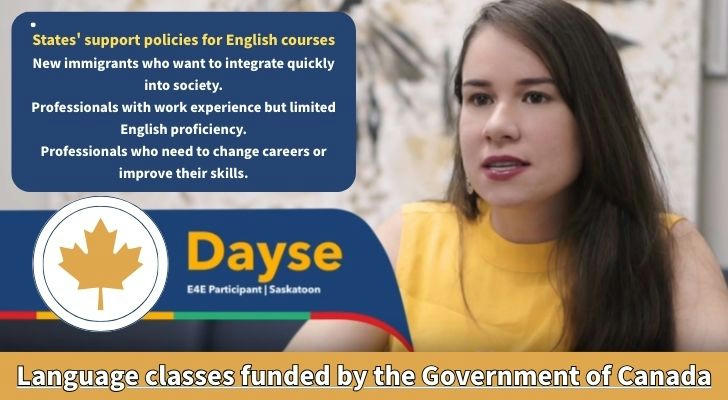Government-Funded English Courses to Advance Your Career in Canada
Canada’s multicultural society and strong economy make it one of the top destinations for immigrants worldwide. To support newcomers in building successful lives and careers, the Canadian government offers a range of English language programs. These courses are designed to improve workplace communication, support professional certification goals, and ease the path to integration. Whether you’re just beginning or looking to polish advanced skills, these programs give you the tools to thrive.

✅ Why Enroll in Online English Certificate Programs?
Improving your language skills is not just about daily communication—it’s a key to unlocking your career potential. Here are the core benefits of enrolling in an English certificate program:
1. Overcome Language Barriers and Integrate into the Workforce
Systematically enhance your listening, speaking, reading, and writing skills.
Adapt to a multicultural environment and gain confidence in communication.
2. Master Practical Workplace English
Learn how to write effective resumes and cover letters.
Participate in mock interviews and understand Canadian workplace culture.
Receive industry-specific communication training for fields like healthcare, IT, and engineering.
3. Obtain Government-Recognized Language Certificates
Receive official certifications upon course completion to enhance your employability.
Support applications for professional licensing and immigration language requirements.
4. Gain Industry-Focused Professional Support
Apply what you learn directly to your career path through targeted language instruction.
Courses include professional terminology, industry case studies, and real-world communication practice.
✅ Government-Funded English Language Training Programs in Canada
💥 1. Language Instruction for Newcomers to Canada (LINC)
Designed for English beginners, this program helps newcomers adapt to daily life and entry-level work environments.
Comprehensive Language Skills: Covers all four skills—listening, speaking, reading, and writing
Integrated with Daily Life & Work: Practical content aligned with real-life and workplace communication
Additional government support: Some programs may include childcare and transportation assistance, depending on eligibility and location.
Clear Admission Requirements: Requires a language assessment (e.g., CLB test); open to permanent residents
💥 2. Employment English Program (E4E)
Tailored for newcomers with basic English skills who want to improve their employability and enter the Canadian job market.
Compact 12-Week Format: Covers all essential job-related language skills
Career-Oriented Content: Includes resume writing, interview preparation, and workplace English
In-Person, Small-Class Teaching: Morning and evening sessions available (see schedule and locations)
Newcomer-Focused Design: Aligns with the local job market to boost your employment success
💥 3. Canadian English Skills (CES)
Provides industry-related English training for new immigrants who want to obtain professional qualifications.
Industry-Specific Curriculum: Emphasizes English for high-demand sectors like healthcare, finance, and IT
Enhanced Communication: Develops writing, industry communication, and reporting skills
Supports Licensing Goals: Builds the language foundation needed for Canadian credentials
Integrated with Real Job Requirements: Based on actual workplace standards and scenarios
💥 4. Occupation-Specific Language Training (OSLT)
A customized program for immigrants with professional backgrounds, helping them return to their fields with confidence.
Professional Terminology Training: Covers vocabulary for sectors like engineering, nursing, and IT
Real-Life Scenario Practice: Includes meetings, client communications, and report writing
Improves Workplace Adaptability: Equips learners with cultural and professional communication norms
Supports Career Relaunch: Ideal for those re-entering their industry or transitioning to a new professional field
✅ How to Apply for Canadian English Courses:
1.Assess your goals: Determine your language level and target industry (e.g., healthcare, IT).
2.Choose a program: Explore options like online certification courses or in-person adult English classes via the IRCC portal.
3.Prepare documents: Submit proof of immigration status (PR card, work permit) and educational credentials.
4.Enroll locally: Contact institutions like St. Martin’s United Church (for E4E morning classes) or provincial training centers.
Who can take Canadian English courses?
| Age Group | Suitable Learners | Course Fit / Goal |
|---|---|---|
| 18–30 | Newcomers looking to integrate quickly | Build daily communication and begin early career development |
| 31–45 | Career changers or professionals with limited English | Transition to high-demand fields or reskill for local industries |
| 46–60 | Experienced professionals upgrading language skills | Improve workplace communication or pursue certifications |
| 60+ | Seniors committed to lifelong learning or volunteering | Gain basic English for community integration and social life |
✅ Provincial Support for English Courses in Canada
Ontario: Offers workplace English courses and career coaching to align skills with local job markets.
British Columbia (BC): Focuses on sector-specific training for high-paying roles in tech, healthcare, and more.
Alberta: Combines practical job skills with language training for sectors like energy and skilled trades.
Quebec: Provides bilingual (French/English) programs to adapt to the province’s unique linguistic landscape.
Additional resources for English Courses in Canada
Beyond language training, the Canadian government supports newcomers with:
Career credential assistance: Guidance on certification recognition for regulated professions.
Job-matching services: Connections to employers based on your skills and experience.
Community integration workshops: Learn cultural norms and access local networks.
Canada Job Grant: Funding for career training in high-growth industries.
Federal Skilled Worker Program: A fast-track immigration pathway for skilled professionals.
✅ Earn Online Certificate Classes to Go From Entry-Level to High-Paying Jobs
Mastering English through these programs opens doors across industries. For example:
Healthcare: A nursing assistant can advance to a registered nurse, with salaries rising from $45,000 to $85,000 annually.
Tech: An IT support specialist can transition to software development, earning over $95,000 per year.
Skilled Trades: A construction helper can become a licensed electrician, increasing earnings from $40,000 to $75,000.
✅ Success Story: From Language Learner to High Earner
"Ahmed, a mechanical engineer from Egypt, struggled to adapt to Canada’s workplace culture. After enrolling in Alberta’s Occupation-Specific Language Training (OSLT), he gained technical vocabulary and interview confidence. Within eight months, he secured a project manager role in Calgary with an $80,000 salary. 'These courses transformed my resume and communication skills,' he shared."
The Best English Programs for Newcomers
Government-backed English programs for newcomers are more than language courses—they are gateways to professional success. By addressing language barriers and aligning skills with Canada’s high-demand sectors, newcomers can transition from survival jobs to thriving, well-paid careers. Take the first step today by exploring programs tailored to your goals.

